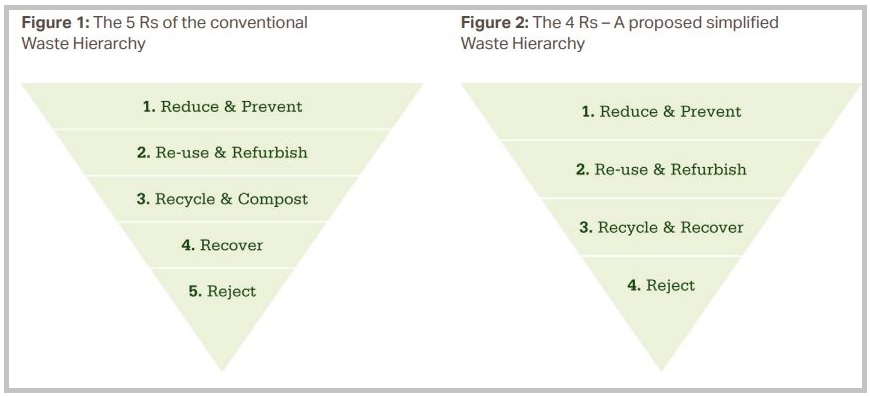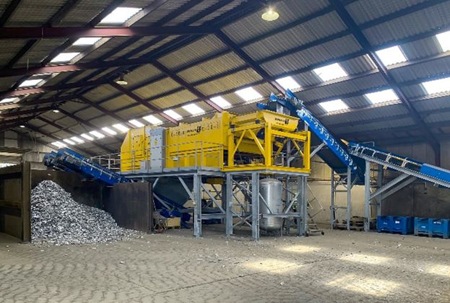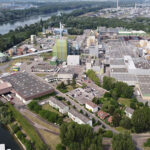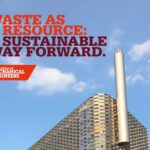In the United Kingdom, the Institution of Mechanical Engineers (IMechE) has called for a “radical rethink” of the waste hierarchy to put the UK on a “more sustainable” path, including sending some recyclables for energy recovery.
The UK’s waste hierarchy has traditionally promoted recycling as better for the environment than energy recovery in terms of waste management options.
The report, ‘Waste as a Resource: A Sustainable Way Forward’, notes that the waste hierarchy concept introduced in the 1990s – and still used today – prioritises recycling, which the Institution says is not always better for the environment.
IMechE describes itself as an “independent association representing mechanical engineers in the UK”. In the report it argues that easily recyclable waste streams such as metals and PET bottles should be given a ‘material-prioritisation’ strategy, while others (e.g. biodegradable materials) are given an ‘energy-prioritisation’ strategy instead of recycling.

The proposed new waste hierarchy on the right sees recycling on a par with energy recovery (source: Institution of Mechanical Engineers)
Changing the approach to the waste hierarchy, says the IMechE, removes the “unhelpful competition” between ‘recycling’ and ‘recovery’ and helps to focus attention on minimising the ‘reject’ tier, ie landfill.
Priorities
IMechE recommends that the current waste hierarchy model should be replaced with one that “genuinely” delivers on the prevention of waste. It also recommends considering how to achieve “optimum use” of all waste streams, adding that some waste streams should be prioritised for material and some for energy.
Valuable resource
Lead author, Professor Ian Arbon, said: “We need to stop seeing waste as a problem and to start seeing it as a valuable resource and use it to maximum advantage. Our proposed modification to the waste hierarchy, which reduces it to four tiers, removes the unhelpful competition between ‘recycling’ and ‘recovery’ and helps to focus attention on minimising landfill.”
The report argues: “Given the current massive and unprecedented increases in the cost of all types of energy supply, which is resulting in many more people in the UK falling into fuel poverty, this source of low-cost, dispatchable energy could have a significantly beneficial impact on the UK, whereas a focus solely on ‘recycling’ will require the consumption of ever more scarce and expensive energy supply from other less sustainable sources.”
Arbitrary targets
Discussing the role of recycling, IMechE said that the focus for two decades has been on recycling and setting “arbitrary targets that have not had clear definition and the practical grounding to be effective”.
Instead, the Institution reasons that each material should be looked at individually. It says: “Contrary to historically prevailing political outlooks, there is no one method of dealing sustainably with all waste streams and each needs to be separately evaluated as to whether it lends itself ideally to being converted into another material item or into energy for power, heat and transport; one should not be considered more important than the other”.
‘Recycling realities’

The IMechE argues that recycling is energy intensive, and for some materials is not environmentally friendly
To back up its viewpoint, the institution included a section entitled ‘recycling realities’, which includes the argument that recycling uses a lot of energy. IMechE says: “Virtually any genuine form of recycling requires large amounts of additional energy most of which will currently be sourced from fossil fuels, exacerbating (not reducing) the greenhouse gas (GHG) emissions problem.
“Indeed, one of the attractions of exporting (or ‘offshoring’) un-recycled waste to developing countries is that the substantial energy and GHG emissions costs have to be accounted for in the importing country, not in the country which created the waste.”
Even genuine recycling “as practised in the UK”, should generally be described as ‘down-cycling’, the institution said, as the resultant product is “often of a lower quality grade than the original”.
Useful link
Waste as a Resource: a Sustainable Way Forward


